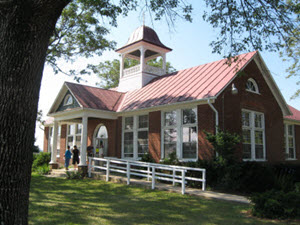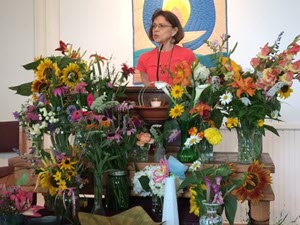
HUU Sermon Archives
Why Easter? Another UU Response
by Judith Hollowood
April 8, 2007
Every talk prepared for delivery in a religious community is at least two talks: the one the writer set out to compose and the one she committed to paper at the end of the process of creation. If you should ever set out to compose a talk, you will probably find that to be true for you. Your ideas change as you focus attention on them. You find out what you really think as you put words to the thoughts and feelings that swirled around when you first glimpsed your topic.
A person who sets out to talk on Sunday morning at HUU doesn’t even have to commit to a published title until the Sunday before he or she is scheduled to speak. I am grateful for that late deadline. You would never have to know where I once thought my talk was going to head.
But let me put my early title in front of you now, as an introduction to the thought adventure I’ve been on in preparation for this 15 or 20 minutes before you. My talk was to have been titled “My Last Easter.” And my intent was to tell you why I didn’t plan to celebrate Easter any more. Perhaps many of you have already reached this conclusion. It is hard to see how Easter has a place in the calendar of observance of a denomination that includes so many people who no longer call themselves Christians, or never did.
There are Unitarian Universalist congregations where Easter has much of the glamour and glory of my Roman Catholic childhood. Lilies in pots covered with purple foil and embellished with satiny white bows crowd the front of those worship spaces. If there is a raised chancel, the lilies line the steps, tier on tier. If there’s an organ, the organist pulls out all the stops. The music includes one or more trumpet voluntaries, and the hair on the back of your neck stands up a little bit. There is a mood of triumphant hope and joy, a mood that you would expect of people celebrating their confidence that they have been redeemed, that the crucified Lord has risen, that death has been defeated.
An honest Unitarian Universalist might ask herself: What am I doing here? But it is all so gorgeous and emotional that the tide of the service rolls past the question and on to the answers that UU ministers provide. These reasons include Jesus of Nazareth’s standing as a great religious teacher. Modern Bible criticism, which attempts to discern the source of individual parts of the gospel accounts, has narrowed down the range of utterances that it is likely an historical Jesus actually spoke. We could focus on these as evidence that a person of such wisdom is worthy of our honor. Or, given the uncertainties of authorship, we could credit Jesus symbolically with all that is wise and good in the deeds and sayings attributed to him. We would never know which were his with certainty. We would be left with a body of deeds and sayings that make no sense to us or even offend. These sayings must be explained to us or explained away. But to honor a teacher and prophet is a good reason to have a holiday.
Another reason to mark Easter has to do with the great themes of renewal, revival and reconciliation that the Easter story puts before us. Without believing the actual Easter story as an historical account, we can benefit from giving deliberative attention to those themes. One Easter my minister told a story of two sisters who lived a few streets apart in our small suburb. Both testy individuals, ready to take offense, they had not spoken to each other in many years. The minister took it on herself to persuade them to reconcile, because one of them did not have long to live. It was near the end of Holy Week that she finally persuaded them to meet and to forgive each other. When she put this story at the heart of her Easter sermon that year, everyone wept. On the cross, Jesus said, “forgive them, for they know not what they do.”. Or as a contemporary has put it, “We know what we do and we know why we do it. But we do not know what “what we do” does.” Who does not need to be forgiven, and who does not feel born again when he or she is forgiven? It is worth while to let the consciousness of our need for revival take a place in the forefront of our hearts. Should we do this on Easter?
Although I loved the gorgeous in-church pageantry, held at a civilized hour, I gradually was drawn to sunrise Easter celebrations. In the church I knew best, the wording in the newsletter hardly varied from year to year and always concluded ominously: “This service will take place regardless of weather.” Gathering in the church parking lot at 5:45 AM was a true test of – of what? Of faith? Of curiosity? The drawing power of this activity was mysterious. And it was not a strong draw; 4 or 5 worshippers might show up.
On many occasions the sunrise service was a celebration of the end of winter and the return of spring. In New England, this was a reasonable theme to pursue. Whether Easter fell on a late date or an early one in any given year, it was entirely possible that the small band would tramp through a remnant of tired snow to reach a gathering spot on an east-facing hillside. It was sometimes very cold; Easter bonnets were knit hats. And the celebrants often set out in darkness and experienced the growing light that is one of the metaphors of this holiday.
Some sunrise services acknowledged the Gospel story. We read it in parts, those of us wise enough to bring our reading glasses, and passed the damp Bible from hand to hand to do it. It was very satisfying to do this; and yet, when we shared our personal reflections toward the end of the service, mine was always “what am I doing here?”
For a long time, I’ve felt that it would be a good idea to return Easter to its Christian owners. Sometimes I imagine myself in their shoes, watching us lost souls and neo-pagans play at their holiday. Christmas has become the common cultural heritage of anyone in the world who wants to enjoy it, and I can understand that. “Each night a child is born is a holy night,” says the reading by Sophia Fahs, and the celebration of new life is a human impulse in every culture. But Easter is different.
There are good reasons to hand it back to Christians as their exclusive holiday. It encompasses the defining event of their theology. Without the crucifixion and resurrection, Jesus bar Joseph is a teacher and political activist, not the savior of humankind. Without his agonized death and its mysterious reversal, he is not a singular being but joins a long line of Jewish prophets. Perhaps his teachings and parables would not have come down to us at all. We have Isaiah, Ezra, Nehemiah – but would we have Jesus?
Luanne Austin, who writes the “Rural Pen” for the Harrisonburg newspaper, reminds us of the fundamentalist Christian view of Easter in her April 6th column this year.
“It’s the one thing that sets the Christian faith off from all the religions in the world. And if, as some claim, the whole resurrection thing was faked, then Jesus was not a great teacher or prophet: he was a swindler.” She goes on to say, “The deal is, either you accept his claims, his teachings and his example, and swallow the whole resurrection thing, or you reject it all. People say, Well, I think he was a great teacher… They must be referring to the nice things he said, like the Sermon on the Mount teachings about the meek inheriting the earth and blessed are the poor and peacemakers. That sermon was important, but a small portion of the things he said. What about his fantastic claims? Jesus made it pretty clear what he was here for. He is either Lord or lunatic.”
Now I agree that this writer’s understanding of the Bible is not based in modern scholarship about the New Testament texts and the early church. But she puts a point bluntly to good effect.. The core assertions of Christianity are outrageous; Christians and non-Christians can agree on that. If I were a Christian, I would not want to see my core belief transformed into a metaphor for the power of love and the resurgence of hope by those who do not make the leap of faith I have made.
If I were a Christian I would say to you, my faith is no metaphor. Easter is fundamental.
Scholarship asserts that the earliest Christians had no truck with metaphor, The resurrection was a fact to them and set them off from other Jews. It isolated them so thoroughly from the Judaism of their time that only by accepting Gentile converts could they save their emerging faith from extinction.
Out of respect for them, a people who believed the improbable with burning confidence, I think I should let Christians should tell us what Easter means and respect their claim. I think I should let Easter be Easter.
I do not lose the metaphorical significance of the spring time of the year if I unhitch it from Easter. I can observe and honor the force in the universe that powers rebirth, renewal and the resurgence of all things green and vital at the arrival of the equinox in March. I wonder why I feel a little silly when I do that, as if only pagans and tree-huggers were dependent on the good graces of nature. We ought to give spring top billing in our annual cycle of grateful observance, it seems to me. All life responds to the swing of the seasons, at opposite poles of the globe. Whether the weather honors the date with a warm breeze on the grass or brings us a surprise of nose-thumbing ice and snow, we ought to be down on our knees in it, thankful for the fortunate space we occupy on this green earth. Whether we call it God’s grace or a happy accident of cosmology, nothing sustains us but the return of the sun and the season of growing.
If I honor spring, have I recaptured every spiritual meaning I need from Easter? Though I have tried to talk myself out of it, I have found one good reason for observance that feels honest to me and respectful of history. Let me conclude by telling you why this is not my last Easter after all.
I think Easter deserves a reverent nod, an honorable mention, a new hat with ribbons and flowers on it, even from a non-Christian Unitarian Universalist. Easter dramatizes, even more profoundly than Christmas, the awesome human ability to create meaning from adversity. Think about the earliest Christians as a sociologist or political scientist might do. Devoted followers of a charismatic prophet, their hopes are dashed when he is arrested and handed over for execution. They can understand the complicity of the Romans, yes, but must also face the involvement of their native leadership in his death. All the consequences of boldly challenging the power-holders of their time are brought crashing home to them.
What can this death mean except that their hope in the Messiah is utterly crushed?
Yet history tells us that a few of them believed there was deeper, life-saving meaning in what they had experienced. In the face of hostility and indifference, they believed that their leader lived, died, and walked again among them after death. We can term them deluded and unscientific, and we can term their adjustment “magical thinking.” But can we not also admire them?
Faced with a puzzle, they persisted on making meaning of it. They resisted the obvious interpretation. They insisted on their new way of understanding their experience of loss and recovery. Their simple understanding and their refusal to explain away the mystery of the reappearance seems to me to sum up the great strength of human beings: the urge to keep going in the face of defeat and discouragement. This is something I can honestly celebrate.
Here is where my mind settles finally when I read the gospel account. Two women go to the tomb of Jesus very early on the first day of the week, when the Sabbath is over. And they are saying to themselves, how will be unseal the tomb, which is closed up by a mighty stone. But looking up to the hillside, they see that the stone has been rolled back. The story goes on:
16:5And entering into the tomb, they saw a young man sitting on the right side, arrayed in a white robe; and they were amazed. 16:6And he saith unto them, Be not amazed: ye seek Jesus, the Nazarene, who hath been crucified: he is risen; he is not here: behold, the place where they laid him! 16:7But go, tell his disciples and Peter, He goeth before you into Galilee: there shall ye see him, as he said unto you. 16:8And they went out, and fled from the tomb; for trembling and astonishment had come upon them: and they said nothing to any one; for they were afraid.
Insofar as I identify with anyone in the Easter accounts it is with the women who went to the tomb, who were afraid. They are minor characters in Mark’s version of the story, but they are major in my imagination. I ask myself what they did later that day. Did they try to put their Easter morning out of mind? Did they accept that their teacher was dead? Did they share the story with a confidant or two and lean in the direction that person’s response suggested to them? Or did they partake in the construction of a new explanation, a new story based on their communal catastrophe?
If I were making an Easter movie, the women at the tomb would be my main characters. I think they stand for all of us as we confront experiences that are new, painful, puzzling, outside our understanding of the world as we have found it up to now. Who knows how we will respond? How will we get beyond our trembling and astonishment? Will history will find us fools or pioneers? There is so much we don’t know, and yet on we go, not knowing.
In my movie, the script will not resolve their puzzlement. The ending will fade to black, and you will leave the theater still uncertain how the story turns out. But though we do not know what meaning our characters will make of their experience, we know that they will turn it into a story full of meaning. Meaning is what thoughtful people make, and the celebration of meaning making – that ceaseless and fundamental human activity – will lie the heart of my future Easter observances. Amen – May it be so.
For the latest sermons and events at HUU, visit our Community Cafe.
Inclement
Weather Policy
Worship
Service Materials


UUs on YouTube
Our denomination has an official presence on YouTube! The Unitarian Universalist Association's YouTube site includes several videos and lots of interesting commentary.
Harrisonburg Unitarian Universalists 4101 Rawley Pike | Harrisonburg,
VA 22801
Mailing Address: | PO Box 96 | Harrisonburg, VA 22803
| (540) 867-0073 | Webmaster
HUU is a member of the Southern
Region of the Unitarian Universalist
Association
Privacy Policy &
Disclaimer
Site Design & Maintainence : Expression
Web Tutorials & Templates


